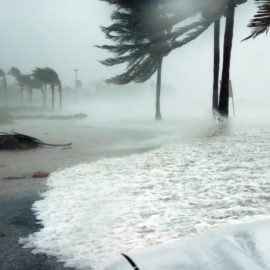
Countries made a big show of pledging but their actions do not mirror their pledges.
Countries around the world are failing to live up to their commitments to fight climate change, pointing Earth toward a future marked by more intense flooding, wildfires, drought, heat waves and species extinction, according to a report issued Wednesday by the United Nations. Just 26 of 193 countries that agreed last year to step up their climate actions have followed through with more ambitious plans. The world’s top two polluters, China and the United States, have taken some action but have not pledged more this year, and climate negotiations between the two have been frozen for months. Without drastic reductions in greenhouse gas emissions, the report said, the planet is on track to warm by an average of 2.1 to 2.9 degrees Celsius, compared with preindustrial levels, by 2100. That’s far higher than the goal of 1.5 degrees Celsius (2.7 degrees Fahrenheit) set by the landmark Paris agreement in 2015, and it crosses the threshold beyond which scientists say the likelihood of catastrophic climate impacts significantly increases.
nytimes.com
Each fraction of warming results in millions being displaced.
With each fraction of a degree of warming, tens of millions more people worldwide would be exposed to life-threatening heat waves, food and water scarcity, and coastal flooding while millions more mammals, insects, birds and plants would disappear. Wednesday’s report comes less than two weeks before nations are set to gather at U.N. climate talks in Sharm el Sheikh, Egypt, to discuss unfulfilled promises and take stock of the fight to stave off environmental catastrophe. But war in Europe, an international energy crisis, global inflation and political turmoil in countries like Britain and Brazil have distracted leaders and complicated cooperative efforts to tackle climate change. On Monday, the European Union said it would increase its emissions reductions pledges “as soon as possible” but could not do so until its member states agreed on a number of upcoming climate laws. That delay is “hugely disappointing” said Niklas Höhne, founder of the NewClimate Institute in Cologne, Germany. “This year we’ve seen little of the climate action governments promised at the end of Glasgow, amid a deluge of new science telling us that we have to move faster, and that limiting warming to 1.5 degrees Celsius is still entirely possible. We need governments to set strong targets that drive emissions down, and decarbonize their economies.”
The Glasgow Summit was a time many pledged to redouble their efforts. They are not.
At last year’s global climate summit in Glasgow, countries pledged to redouble their efforts to cut the emissions from burning oil, gas and coal that are dangerously heating the planet. They also agreed to increase funding for technologies to help developing economies transition away from fossil fuels to wind, solar and other renewable energy sources. The United Nations report analyzed the commitments made by countries to cut their emissions, known as nationally determined contributions, or N.D.C.s. Countries that signed the 2015 Paris agreement promised to update and strengthen their commitments every five years. The 2020 meeting was postponed a year because of the coronavirus pandemic. In 2021, acknowledging the urgency of the climate crisis, nations agreed not to wait another five years and instead pledged to make new commitments before the climate talks that begin Nov. 7 in Egypt. Taryn Fransen, a senior fellow at the World Resources Institute, a research organization, called the current trajectory of global temperature increase “dangerously high.”
Compounding the lack of responses, China is one of the biggest holdouts.
China, currently the world’s biggest emitter of greenhouse gases, is one of the major holdouts on new commitments, though it did submit a new pledge before last year’s summit in Scotland. China has said its carbon dioxide emissions will continue to grow until they peak by 2030, but it has not set targets for reducing other greenhouse gases, such as methane, which it emits in amounts large enough to equal the total emissions of smaller nations. Last year, China said it would stop building coal-burning power plants overseas. As of August, 26 out of 104 such projects had been shelved, preventing 85 million tons of carbon dioxide from being added each year into the atmosphere, according to the Center for Research on Energy and Clean Air.
Even with the holdouts, the rate of emission will slow but not enough to avoid ill effects.
An analysis by the World Resource Institute found that current promises by nations would reduce global greenhouse gas emissions by around 7 percent from 2019 levels, even though six times that, a reduction of 43 percent, would be necessary to limit global warming to 1.5 degrees Celsius. “Of the major economies, we have seen a few countries update this year. India formalized its commitments; Australia updated theirs when they got a new government in place; Indonesia followed through,” said Ms. Fransen of the World Resources Institute. “But each of those countries had failed to update their N.D.C.s until now, so they are making up for lost time.” The United States, in passing the Inflation Reduction Act, which contains hundreds of billions of dollars in subsidies for cleaner technologies, has jumped forward in its ability to make good on its promise to cut emissions by between 50 and 52 percent below 2005 levels by the end of this decade. But the new law will still only get the United States about 80 percent of the way to its current pledge to cut emissions, Ms. Fransen said. Mr. Höhne said the United States’ new law was the strongest move made by a major emitter in 2022, but was “30 years overdue.”
The war in Ukraine is not helping.
The war in Ukraine, which upended global energy markets, as well as an unrelenting spate of climatic calamities such as ruinous flooding in Pakistan and Nigeria and record droughts in the Horn of Africa and China, will loom over this year’s climate summit, known as the Conference of Parties, or COP27. The gathering in Egypt is expected to focus on whether wealthy nations that have emitted most of the carbon dioxide that is driving climate change should compensate poor countries that have not contributed significantly to the problem and are the least prepared for its impacts. Though an agreement on compensation is unlikely to be reached, the topic is expected to make it onto the conference’s formal agenda for the first time. Lesser-developed and low-lying island nations will press for compensation to be formalized through the creation of an international fund where they could submit claims of climate-change related loss and damage. The United States, Europe and other wealthy countries have opposed the creation of such a fund, in part because they fear being held legally liable for skyrocketing disaster costs. The release of the U.N. report provoked grumbling from those in the developing world who were quick to point out that, of the few countries that strengthened their pledges this year, most are not heavy polluters. “The latest U.N. report once again shows that those most responsible for the climate crisis remain unwilling to face up to their responsibilities,” said Mo Ibrahim, a Sudanese-British businessman turned philanthropist who has convened African leaders to discuss the climate crisis ahead of the summit in Egypt. “Unless urgent action is taken to hold richer countries to account, the developing world will continue to foot the bill, at the cost of numerous lives.”
There is greater research on the harm fossil fuels does to humans.
On Tuesday, The Lancet, one of the world’s leading health journals, published a report highlighting the growing threat of fossil fuels to human health. The report raised concerns not only about the direct health consequences of rising temperatures, including heat-related mortality, pregnancy complications and cardiovascular disease, but also the indirect costs, including the effects that drier soil could have on malnutrition and how a changing climate can expand habitats suitable to mosquitoes that carry dengue fever or malaria, ticks that carry Lyme disease, and the pathogens that cause diseases like cholera and Valley fever. “We see how climate change is driving severe health impacts all around the world, while the persistent global fossil fuel dependence compounds these health harms amidst multiple global crises,” said Marina Romanello, executive director of The Lancet Countdown, in a statement.
John Kerry is calling all to do better but as an American we need to do more faster.
John Kerry, President Biden’s climate envoy, called on China, Russia, Saudi Arabia and Mexico as well as all other leading economies to align their climate policies with the goal of constraining global warming to 1.5 degrees. “We all know the top 20 economies are responsible for 80 percent of emissions,” Mr. Kerry said during a speech Tuesday at the Council on Foreign Relations. Their pledges should be strengthened this year, he said. “That’s what people agreed to do,” he said. “It takes all to get the job done.”
The need and urgency is there but the will is not.



